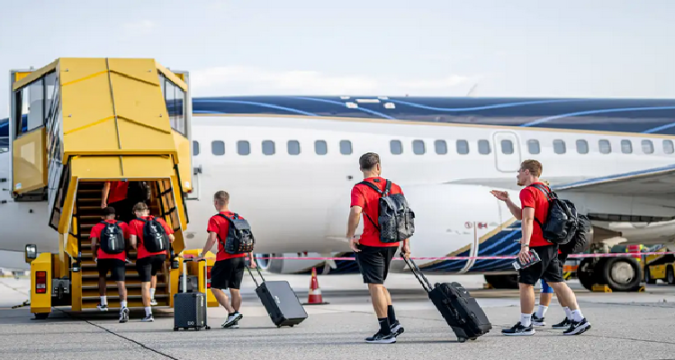
Travel logistics for away games are essential for football teams aiming to maintain peak performance while competing on foreign turf. Coordinating transportation can be challenging, with teams requiring efficiency, flexibility, and comfort to ensure players arrive prepared and focused. A well-organized transportation strategy for away games can significantly impact team morale, performance, and overall success. Here, we outline effective transportation strategies for football teams traveling to away games to ensure a smooth, seamless experience from departure to return.
1. Early and Strategic Planning
Planning for away game transportation should begin as soon as the schedule is confirmed. Starting early allows teams to secure the best travel options, avoid last-minute stress, and ensure that every detail aligns with the team’s schedule and needs. Early planning should include assessing the travel distance, identifying potential transportation modes, and coordinating with local transportation services at the destination.
For shorter trips, team buses are often preferred for their convenience and control over departure times. For longer journeys, especially those requiring flights or trains, securing tickets and schedules early allows teams to select direct options, minimizing layovers and travel fatigue. Additionally, early planning allows for bulk ticket purchases, which can be cost-effective and ensure that the team and staff can travel together.
2. Selecting the Right Mode of Transport
Choosing the correct mode of transportation is crucial to meet the team’s needs based on travel distance and time. For shorter distances, a team bus is an ideal option as it allows players to travel together, facilitating team bonding and a sense of unity. Coaches equipped with comfortable seats, air conditioning, and Wi-Fi can improve the journey quality and help players stay relaxed or focused on game preparation.
For longer distances, flights are often the best choice, particularly direct flights if available. Teams should avoid multiple layovers or lengthy connections, as these can increase player fatigue and disrupt the rhythm of game-day routines. For medium distances, trains can be an excellent alternative to buses and flights, offering ample space, stability, and a smoother ride, allowing players to rest and recover.
3. Coordination with the Destination
To avoid last-minute issues, it’s essential to coordinate closely with the host venue and local transportation providers at the destination. Notify the venue of the team’s expected arrival time, mode of transport, and any specific requirements such as secure parking, loading areas, or locker room accessibility. By coordinating with the stadium or hotel, teams can streamline the arrival process, minimize delays, and ensure players have ample time to prepare upon arrival.
For teams flying or taking the train, arranging ground transportation to and from airports, train stations, and hotels in advance is equally important. Knowing the local traffic patterns and having an on-the-ground contact can make a significant difference in avoiding congestion and delays, especially if the match is in a busy metropolitan area. When possible, have contingency transportation options, such as backup shuttles, in place should the primary mode of transit face unexpected challenges.
4. Creating a Flexible Travel Schedule
A flexible travel schedule is vital for a seamless travel experience. Travel schedules should account for potential delays such as traffic, inclement weather, or flight changes. Including buffer time between connections and planning for early arrival gives teams time to handle unforeseen issues without compromising their game-day readiness. Establishing a detailed itinerary with contingencies in place ensures that all parties involved know the plan and can adjust as needed.
Teams should have multiple contingency plans in place, including alternative routes or modes of transportation, in case the primary route becomes unavailable. For example, if the team bus faces an unexpected road closure, an alternate route should already be mapped out. If flight delays occur, having a designated travel manager to liaise with airlines for rescheduling and inform the destination of new arrival times can minimize disruptions.
5. Prioritizing Player Comfort and Well-being
Ensuring players’ comfort during travel is a crucial element of an effective transportation strategy. Long hours of travel can cause fatigue, stiffness, and lack of focus, which directly impacts performance. Teams should prioritize transport providers who offer comfortable seating with adequate legroom, climate control, and access to onboard facilities like restrooms and Wi-Fi.
For bus journeys, regular stops for stretching and refreshments are essential to keep players feeling fresh. On flights or trains, business-class or extra-legroom seating is preferred to provide players with space to relax and recover. Providing meals, snacks, and hydration during travel also keeps players fueled and energized, helping them arrive at the destination in peak condition.
6. Streamlining the Post-Game Return Journey
The return journey is just as important as the trip to the game. Ensuring that post-game transportation is organized and readily available prevents delays that can prolong an already demanding day. Quick access to transportation after the game allows players to begin recovery and rest without further delays.
For longer return journeys, teams may consider booking overnight accommodations if it ensures players get adequate rest. If the journey requires travel overnight by bus, choosing a provider with reclining seats or sleeping amenities can make the trip more restful. Minimizing travel time on the way back helps players recover faster, allowing them to regroup for the next training session or match.
Conclusion
Creating a seamless travel experience for away games requires a combination of careful planning, flexible scheduling, and a strong focus on player comfort. By selecting the right transportation mode, coordinating with local venues, and building contingencies into the travel schedule, teams can reduce stress, maximize efficiency, and support optimal performance. A well-executed travel plan can positively influence team dynamics, ensuring that players arrive prepared, focused, and ready to compete at their best.